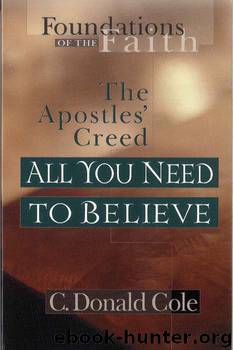All You Need to Believe by C. Donald Cole

Author:C. Donald Cole [Cole, C. Donald]
Language: eng
Format: epub
ISBN: 978-1-5756-7643-2
Publisher: Moody Publishers
Published: 1983-03-17T05:00:00+00:00
Peter interprets the psalm he quotes. He says that because David was a prophet, “he looked ahead and spoke of the resurrection of the Christ, that He was neither abandoned to Hades, nor did his flesh suffer decay” (v. 31).
The passage from the psalm is not as clear as it first appears; it does not state categorically nor necessarily imply that Christ’s Spirit went to hades. Nevertheless, this is one of two or three important passages on which the creedal statement is based. Did Christ’s spirit go to hades? We know where His body was—in a new tomb in a garden near where He was crucified Where was His soul?
The Lord Himself said that He would be in paradise. When the thief who was crucified beside Him asked Jesus to remember him when He came into His kingdom, Jesus told him that he would not have to wait till then. “Today,” Jesus said, “you shall be with Me in Paradise” (Luke 23:43).
Where was that paradise? Some students believe it was heaven. The word is used only twice again in the New Testament, and in each instance it seems to indicate the presence of God. For example, in Revelation the Tree of Life is said to be “in the Paradise of God” (Revelation 2:7; cf. 22:2). According to that interpretation, at death our Lord’s spirit went to heaven, to await the resurrection of His body. Those who hold that view believe that is what the Lord Himself indicated when He said, “Father, into Your hands I commit My spirit” (Luke 23:46).
That interpretation is certainly possible, but it is not required by the texts cited. When Jesus committed His spirit into the Father’s hand, He may have only acknowledged the Father’s power to dispose of it as He willed. Moreover, in the Greek translation of the Old Testament the same word that gives us “paradise” in the New Testament is translated “garden” or “grove.” For example, the Garden of Eden is a paradise,1 an equivalent of “Abraham’s bosom,” a poetic term descriptive of the place of the blessed dead (Luke 16:22).
It does not matter where Jesus was during the interval between His death and resurrection. If it did, the Scriptures would have been much clearer than they appear to be. The emphasis in the Bible is not on the place where He spent the three days and three nights. The emphasis is on the truth that He did not stay there; He came back to His disciples. He was raised from the dead, even as He said He would be.
We do not have to decide whether we believe that Christ’s spirit went to hades. What we must believe is that His spirit was not abandoned to hades. Death in all its aspects, including the disposition of both body and soul, was only temporary. Three days after His burial He emerged from the grave, body and soul intact. Scriptures in support of this great truth are unmistakably clear. If, as the Creed affirms,
Download
This site does not store any files on its server. We only index and link to content provided by other sites. Please contact the content providers to delete copyright contents if any and email us, we'll remove relevant links or contents immediately.
The Secret Power of Speaking God's Word by Joyce Meyer(3167)
More Language of Letting Go: 366 New Daily Meditations by Melody Beattie(3017)
The Holy Spirit by Billy Graham(2942)
To Light a Sacred Flame by Silver RavenWolf(2813)
Tuesdays With Morrie by Mitch Albom(2751)
The Lost Art of Good Conversation by Sakyong Mipham(2639)
The Traveler's Gift by Andy Andrews(2454)
Kundalini by Gopi Krishna(2179)
A Kingsbury Collection by Karen Kingsbury(2092)
Anxious for Nothing by Max Lucado(1967)
Finding Chika by Mitch Albom(1966)
Angels of God: The Bible, the Church and the Heavenly Hosts by Mike Aquilina(1952)
Angels by Billy Graham(1920)
As a Man Thinketh by James Allen(1897)
Curse Tablets and Binding Spells from the Ancient World by Gager John G.;(1858)
The Yoga of Jesus: Understanding the Hidden Teachings of the Gospels by Paramahansa Yogananda(1845)
Barking to the Choir by Gregory Boyle(1819)
Autobiography of a Yogi (Complete Edition) by Yogananda Paramahansa(1811)
How To Be Born Again by Billy Graham(1775)
